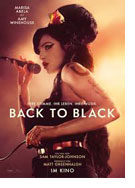

Opening 11 Apr 2024
Directed by:
Sam Taylor-Johnson
Writing credits:
Matt Greenhalgh
Principal actors:
Marisa Abela, Jack O'Connell, Eddie Marsan, Lesley Manville, Juliet Cowan
English director Sam Taylor-Johnson and writer Matt Greenhalgh’s entertaining, if not scrupulously sanitized, biopic is about the Grammy Award winning Amy Jade Winehouse. Bypassing her childhood and parents’ divorce when she was nine years old, the Winehouse music heritage plus teenage school accolades and otherwise, the filmmakers confine themselves to the period when Amy is tumbling into notoriety leading up to her “groundbreaking Back to Black 2006 album.”
Opening during a family Jewish celebration, (between age fourteen when Amy began writing songs/music and sixteen when she signed a recording contract), Amy’s close relationships with paternal grandmother Cynthia, a retired jazz singer, and her father are established. Lesley Manville’s performance as Cynthia is sensitive, moving, and Eddie Marsan as Mitchell Winehouse, a taxi driver, manages the tricky business of portraying someone parental, and someone vicariously living his daughter’s successes.
The payoff for viewers is Marisa Abela’s spirited, enthralling performance. Abela voice trained extensively; Anne-Marie Speed, her performance coach said, “[P]eople underestimate how physical voice production work is.” Abela zestfully wiggles and struts belting out the songstress’s soul-felt musical compositions with the recognizable deep, raspy, and emotively powerful contralto voice. Amy’s music composition eclecticism spanned jazz, soul, reggae, and influential Black singers, e.g., Sara Vaughn, Billie Holiday, etc. While negotiating a big deal orchestrated by Amy’s manager Nick Shymansky (Sam Buchanan) she adamantly stresses, “I ain’t no fucking Spice Girl.” Which is the leadup to Amy meeting Blake (Jack O'Connell), and their turbulent on-again, off-again co-dependent deep dive into abhorrent behavior, a short marriage, and Amy’s self-destruction that fostered, ironically, her award-winning eponymous album.
Greenhalgh’s disjointed screenplay becomes more muddled hopscotching from setting to setting as characters are whisked on/off screen leaving audiences to guess at their connection, e.g., Julie (Harley Bird), Amy’s roommate. Polly Morgan’s cinematography does not fill in gaps in the dialogue, and Laurence Johnson and Martin Walsh’s sloppy editing add to the confusion. Lacking lower third titles with the locations/dates of Amy’s many (onscreen) public performances perpetuate viewers’ disorientation; considering its length—122 minutes—Back to Black’s content could have been much broader. With its Winehouse family imprimatur, it is clear the ne'er-do-well is Blake, just as there is an abdication of any parental/family responsibility. One well-earned star goes solely to Marisa Abela’s performance. (Marinell Haegelin)